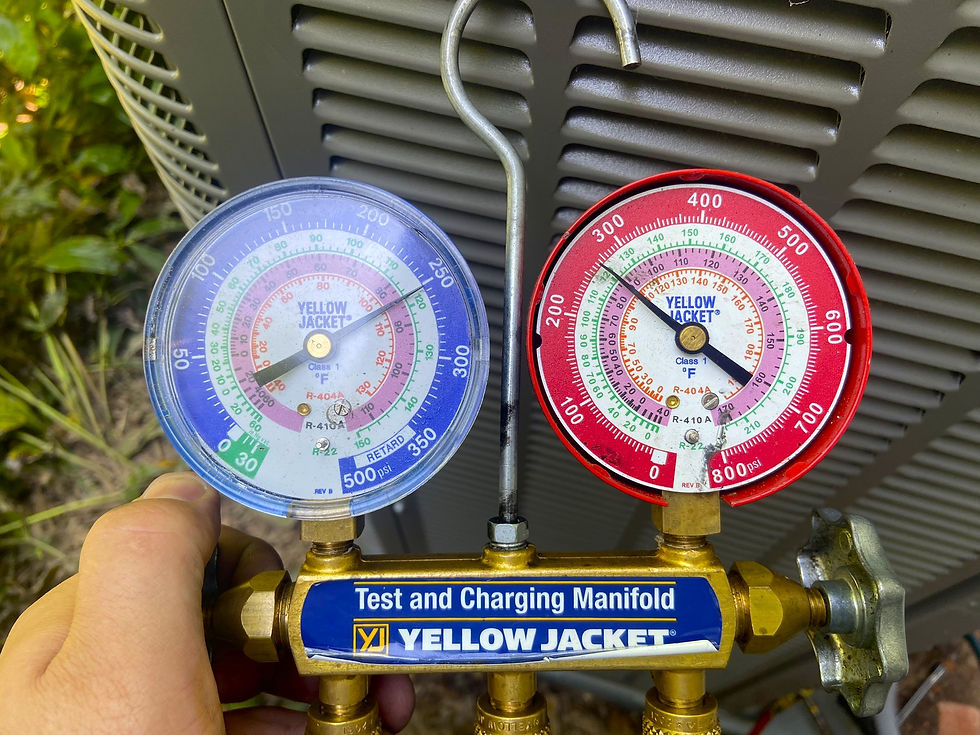Do I Need Preventive Air Conditioning Repairs?
- Arianne Large

- Aug 12, 2025
- 3 min read
Updated: Aug 13, 2025

It's not always easy to identify problems with your air conditioner, especially if it seems to work well most of the time. However, HVAC systems will exhibit signs of issues that can be resolved with preventive air conditioning repairs long before a complete failure occurs. Let's take a look at the early warning signs of an air conditioner breakdown and why it's smart to act quickly to prevent costly repairs.
Short Cycling: An air conditioner short cycling is when your system turns on and off in rapid succession without completing a full cooling cycle or meeting your thermostat's set temperature. This prevents the system from effectively cooling your home and can lead to excessive wear and tear on the unit and increased energy consumption. Short cycling can be caused by a variety of issues including dirty filters, refrigerant leaks, oversized equipment, thermostat problems, inconsistent or low voltage, or a faulty compressor.
Decreased Airflow: Poor airflow is a common but often overlooked warning sign that your AC might be failing. It can suggest internal system issues that haven't triggered a complete failure yet but are heading in that direction. Potential issues include dirty air filters, leaky or blocked ductwork, a failing blower motor, or blower capacitor.
Longer Run Cycles: If your air conditioner is taking longer to cool your home, it's not just working harder - it could be breaking down. Longer run times are one of the earliest signs that something is wrong. Your system could have dirty condenser or evaporator coils, low refrigerant levels, or a failing blower motor or compressor.
High Humidity: Not only does your air conditioner cool your home, it also removes moisture from the indoor air. Well-maintained air conditioning systems should keep your home's relative humidity between 30 and 50%. If it seems your HVAC system is struggling to maintain humidity levels in your home, you may start to experience problems such as mold growth, a musty odor, peeling paint, visible water stains, and more. Common culprits include low refrigerant levels, dirty evaporator coils, leaky ducts, clogged drain lines, and improperly sized equipment.
NOTE: If you notice moisture accumulating on walls, floors, or furnishings in the summer, make sure the FAN setting on your thermostat is set to AUTO, not ON. Running the fan continuously can contribute to high humidity.
Ineffective Cooling: Your air conditioner should be able to keep up with your thermostat. If your system is running but the air feels barely cool, that's a critical warning. This issue is often overlooked because the system appears to be functioning. Poor performance is one of the most evident signs your system could give you. Common causes include low refrigerant levels, malfunctioning compressor, restricted airflow, or leaking components.
Higher Energy Bills: A gradual increase in electricity costs during the summer can be easily dismissed, especially when it's starts getting hotter. However, if the home's cooling habits haven't changed and the utility bill is still increasing, this could be evident that your AC is about to break down. Higher energy bills could indicate reduced efficiency, refrigerant leaks, aging or dirty components, faulty sensors, or electrical issues.
Unusual Noises: Air conditioners always make some noise, but they shouldn't screech, grind or bang. An air conditioner that still cools but sounds different could be on the edge of failure. If it doesn't sound like normal operation, it probably isn't. If these signs are overlooked, they often lead to critical damage to components.
Many homeowners delay addressing minor air conditioning issues if the system is still cooling. But minor problems can reduce system efficiency and increase wear on critical (more expensive) components. Ignoring the signs increases your risk of sudden system failure, higher repair costs, and reduced comfort and air quality.
If you've noticed any signs that your air conditioning system is about to break down, now is the time to act. Schedule a professional inspection or repair to avoid costly surprises.



